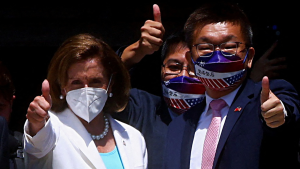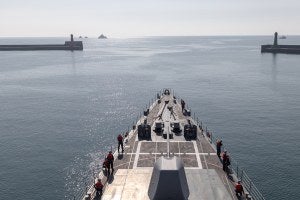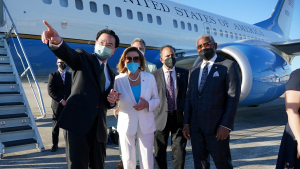Washington has started selling arms that serve a "porcupine" defense strategy to Taiwan. Whether Taipei fully embraces this new approach remains to be seen.
Taiwan, claimed by China as a rogue province and armed by the United States, is at a crossroads. Should it continue buying big-ticket US arms, such as advanced fighter jets and tanks, to counter Chinese forces in case of a blockade or invasion? Taipei’s longstanding conventional strategy, which calls for these kinds of arms, views the ambiguous US defense commitment as concerning. Since Washington may not intervene against a Chinese attack, conventionalists want to hold on to Taiwan’s traditional, long-range weapons. Conventionalists also claim that buying big-ticket arms strengthens Washington’s political commitment to Taiwan.
However, officials and experts increasingly see another strategy as prudent. Recent Chinese economic growth and military modernization have greatly enhanced Beijing’s capabilities, to the point that many believe Taiwan could not hold out alone against a Chinese invasion. Reformers thus argue that Taiwan needs to start building its forces around small, easily distributed weapons such as mobile anti-ship missiles and patrol boats and make greater investments in reserve forces and territorial defense. This “porcupine” defense strategy can theoretically buy more time for US forces to arrive in a war.
The fate of Taiwan’s military strategy, which also depends greatly on political relations between Beijing, Taipei, and Washington, will help determine the strength of deterrence in the Taiwan Strait. A breakdown in this deterrence could lead to US-China war. The United States not only influences Taiwan’s strategy, but has a great stake in its future.
Key Findings
- Rising Chinese military power has caused many in Taipei and Washington to advocate a shift toward asymmetric (porcupine) defense in place of Taiwan’s conventional concepts.
- Conventional defense advocates argue that Taipei should hold on to its big-ticket systems because they are most worried that the United States will not send forces if Beijing invades or blockades Taiwan. In their view, big-ticket systems can address this, both by leaving Taiwan better prepared and by demonstrating more US commitment.
- On the other hand, porcupine defense advocates argue that the Taiwan should reorient its defense strategy because of China’s growing power. To them, Taipei’s foremost priority should be buying time for US forces to arrive in an invasion.
- High-profile US weapons systems, like fighter jets and tanks, have tradeoffs—they can serve the conventional strategy, but not the porcupine strategy, and their high costs crowd out other spending in Taiwan’s limited military budget.


Related Content
 Public Opinion
Public Opinion
Should China invade Taiwan, 2022 Chicago Council Survey data show most Americans would support sending arms but not US troops.
 Defense and Security
Defense and Security
Dina Smeltz and Craig Kafura argue that a majority of Americans support backing Taiwan as the U.S. has backed Ukraine, as long as U.S. troops aren’t involved.
 Defense and Security
Defense and Security
"Washington appears to have underestimated or dismissed the possibility of a severe Chinese reaction to Pelosi’s visit," writes Paul Heer in the National Interest.

